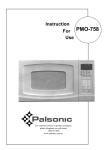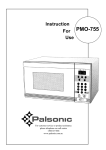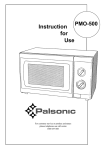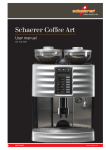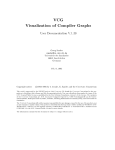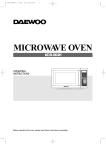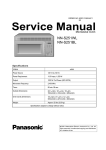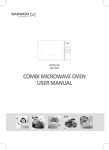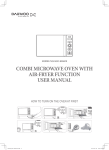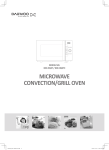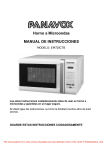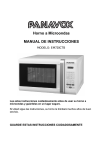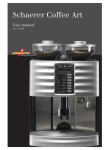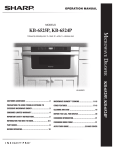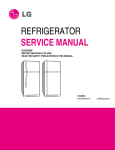Download Palsonic PMO-585 User's Manual
Transcript
Instruction For PMO-585 Use For customer service or product assistance please telephone our call centre 1300 657 888 www.palsonic.com.au CONTENTS INSTALLATION Before installing the oven Place Electrical installation OPERATION Use of the microwave What are microwaves? MICROWAE OVEN FEATURES CONTROL PANEL FEATURES SETTING THE CLOCK USING THE MINUTE TIMER USING ADD MINUTE USING YOUR MICROWAVE OVEN Reheating tips Cooking at different cook powers Cooking with more than one cook cycle Using Baked potatoes Using Popcorn Using Defrost Defrosting tips Using Reheat Repeating Tips Using Vegetables Cooking Chart Defrosting Chart Reheating Chart MAINTENANCE Cleaning the microwave USEFUL HINTS Use of the microwave When cooking food Manual defrosting The amount of food The humidity content Pressure in foods The standing time Arranging food The tools and containers to use - How to check whether a container is suitable for microwave cooking - Container shape Trouble shooting TECHNICAL SPECIFICATIONS 1 INSTALLATION BEFORE INSTALLING THE OVEN Make sure that the oven door closes correctly and that the seal is not damaged. PLACE Take account of the following recommendations when installing the microwave: 1. Keep it away from heat sources (e.g. oven). Heat affects correct appliance operation. 2. Keep a distance of about 3 cm between the wall and the back part. Allow a minimum space of 3 cm between the microwave top and the unit, if the appliance is to be installed below a unit. Taking account of these recommendations guarantees suitable ventilation. 3. Place the microwave on a flat and stable surface that is strong enough to hold the oven and the additional weight (food-utensils). Remember that the control panel side is the heavy side. 4. The oven ventilation openings must NOT be covered. Blocking the ventilation or the openings may affect correct oven operation and give poor cooking results. 5. Install the oven at least 2 m from radio, television or aerial to avoid interference. ELECTRICAL INSTALLATION Before connecting the microwave oven - Check that the electrical supply voltage is correct. - Have a socket with earth discharge suitable for the product’s power. - Use protective fuses for the line. Do NOT Change the plug for any reason, shortening the mains cord. Do not use multiple sockets or adapters to make the connection, either. N. B.: If you do not have a socket with earth, contact a specialist to make a correct earth connection. This recommendation is for SAFETY REASONS. UNDER NO CIRCUMSTANCE change the plug, shortening the mains cord, or use adapters to make the connection. Important: All our units are manufactured to the strictest safety standards. For total user protection THIS APPLIANCE MUST BE EARTED. If you do not have a correct earth connection, contact a specialist for its installation. The manufacturer will accept no responsibility for injury to persons or damage to objects arising from the non-observance of this requirement, even with the additional protection of a differential circuit breaker. 2 OPERATION USE OF THE MICROWAVE - Do not use the oven cavity for storage purposes. - Do not leave paper, cooking utensils or food in the cavity when not in use. - Make sure that children do not swing on the door when it is open. The oven should not be operated empty when using microwaves. Operation in this manner is likely to damage the appliance. If you want to practice programmmg, put a glass of water inside the oven, to absorb the microwaves. WHAT ARE MICROWAVES? Microwaves are like TV waves or light waves. You cannot see them, but you can see their effect. Just as ordinary daylight passes through glass, plastic or air, microwaves pass through materials like paper, glass, porcelain, plastic and air. These materials do not contain water or metal and will consequently not be heated up by the microwaves. Microwaves are reflected by metal in the same way as light is reflected by a mirror. Microwaves are absorbed by water, oil and fat. The water, oil and fat molecules are excited by microwaves and rub against each other, thus producing heat, and the rubbing speed determines the temperature. This is why the food heats so quickly. Microwave energy is not hot. It simply causes the food to produce its own heat. When we heat food with infrared waves (e.g. GRILL) in a traditional oven, the heat reaches the food surface and then reaches its centre by conduction. Food has a rather poor ability to conduct heat and thus needs a long time to heat up. Using microwaves saves time. You save time and electricity, especially when cooking small amounts of food. An example: If you boil fish in a sauce-pan with water, the energy must first heat the pan and then the water which will heat the fish. In a microwave oven nearly all the energy is converted into heat inside the food which cooks more quickly, saving electricity and a lot of time. Cooking Time: 20-25 min. Cooking time: 10 min. 3 OPERATION ACCESSORIES Turntable support - Use the support under the glass turntable. - Do not put any tool on the support, only the glass turntable. - The support can be washed in the dishwasher. Positioning: - Put the support on the seat in the bottom of the microwave (internal cavity). Glass turntable - Use the turntable with all cooking methods. The turntable collects the dripping juices and food particles that otherwise would stain the inside of the oven. - The turntable can be washed in the dishwasher. Positioning - Put the glass turntable on the support. 4 Microwave oven features 1. One-Touch Door Open Button. Push to open door. 2. Door Safety Lock System. The oven will not operate unless the door is securely closed. 3. Window with Metal Shield. Shield prevents microwaves from escaping. It is designed as a screen to allow you to view food as it cooks. 4. Glass Turntable This turntable turns food as it cooks for more even cooking. It must be in the oven during operation for best cooking results. 5. Turntable Support (under turntable). 6. Control Panel. Touch pads on this panel to perform all functions. 7. Light. Automatically turns on when door is opened or when oven is operating. 8. Model and Serial Number Plate (on back). 5 Control panel features Your microwave oven control panel lets you select a desired cooking function quickly and easily. All you have to do is touch the necessary Command pad. The following is a list of all the Command and Number pads located on the control panel. 1. DISPLAY. The display includes a clock and indicators to tell you time of day, cooking time settings, and cooling functions. 2. REHEAT. Touch this pad l-4 times to reheat food from one of four preset categories. You do not need to enter cooking time or cook power. 3. DEFROST. Touch this pad followed by Number pads to thaw frozen food. 4. POPCORN. Touch this pad to pop a snack size (1.75 oz [50g])bag of popcorn. You do not need to enter cooking time or cook power. 5. BAKED POTATOES. Touch this pad followed by Number pads to bake l-2 potatoes. You do not need to enter cooking time or cook power. 6. BEVERAGE. Touch this pad to reheat a beverage. The oven will automatically heat for a preset time and cook power. 7. VEGETABLES. Touch this pad l-2 times to cook vegetables from one of two preset categories. You do not need to enter cooking time or cook power. 6 8. COOK TIME. Touch this pad followed by Number pads to enter cooking times. 9. COOK POWER. Touch this pad, after the cook time has been set, followed by a Number pad to set the amount of microwave energy released to cook the food. The higher the number, the higher the power or faster the cooking speed. 10. CLOCK SET. Touch this pad followed by Number pads to enter the correct time of day. 11. Number Pads. Touch Number pads to enter cooking times, cook powers, and quantities. 12. ADD MINUTE. Touch this pad to cook for one minute at 100% cook power or to add an extra minute to your cooking cycle. 13. OFF/CANCEL. Touch this pad to erase an incorrect command or to cancel a program during cooking. This pad will not erase time of day. 14. START/ENTER. Touch Number pads to enter cooking times, cook powers, and quantities. NOTES: If you choose an auto cook function and change your mind, you must press OFF/ CANCEL before you choose another auto cook function. If you attempt to enter unacceptable instructions, three tones will sound, and “Err” will appear on the display. Touch OFF/ CANCEL and re-enter the instructions. Once you choose a function, an indicator light ( will flash as a prompt for the next action you need to perform. If you choose a function but do not press another command pad within one minute, the dispaly returns to the time of day and you have to start over again. If you have entered all settings for a function but do not touch the Start/Enter pad in 5 seconds, the Start? indicator light will flash. If you open the door while the oven is on and then shut the door, the Start? indicator light will flash. Audible signals Audible signals are available to guide you when setting and using your oven: A programming tone will sound each time when you touch a pad. Four tones signal the end of a cooking cycle and two tones will sound every minute until you open the door or press the command pad. Three tones will sound if you enter incorrect instructions. Interrupting cooking You can stop the oven during a cycle by opening the door. The oven stops heating and the fan stops, but the light stays on. To restart cooking, close the door and TOUCH START If you do not want to continue cooking: Close the door and the light goes off. OR TOUCH CANCEL NOTE: Before setting a function, touch CANCEL to make sure no other function is on. 7 Setting the clock If you enter an incorrect time, three tones will sound, "Err", then "0" will appear on the display. Reenter the correct time. If you touch OFF/CANCEL while setting the clock, the clock will return to the time already on the dispaly. When your microwave oven is first plugged in, or after a power failure, the display will show ":", If a time of day is not set, ":" will stay on the display until you set the clock or another function. NOTES: You can only set the clock if the oven is not cooking food. To set time: 1. Choose the setting. TOUCH YOU SEE CLOCK TOUCH 2. Enter the time of day. Example for 5:30: YOU SEE 5 3 0 TOUCH 3. Touch CLOCK/SET or START/ENTER. CLOCK OR START 8 (Start? indicator light flashes after 5 seconds) YOU SEE Using the minute timer Your microwave oven can be used as a kitchen timer. Use the minute timer for timing up to 99 minutes, 99 seconds. NOTE: You can use the minute timer to set a delayed start time. Set the delayed start time with the minute timer by following Steps 1 and 2 below. Then set cook time as described in the "Using Your Microwave Oven" section. 1. Touch 0. TOUCH YOU SEE 0 2. Enter the time to be counted down. TOUCH YOU SEE 5 0 (Start? indicator light flashes after 5 seconds) 0 3. Start the countdown. TOUCH START 9 YOU SEE Using ADD MINUTE ADD MINUTE lets you cook food for one minute at 100% cook power or add an extra minute to the current cooking cycle at the current cook power. You can also use it to extend cooking time in multiples of one minute, up to 99 minutes. NOTES: To extend cooking time in multiples of one minute, touch ADD MINUTE repeatedly during cooking. You can use ADD MINUTE when timed cooking, defrosting, or running any function with preset time (for example, BEVERAGE). If you touch ADD MINUTE during cooking, the oven will cook at the currently selected cook power. Before starting: 1. Make sure the food is in the oven and the door is closed. 2. Touch ADD MINUTE. TOUCH YOU SEE ADD MINUTE (example: one for one minute) 3. Start the oven. TOUCH (For 5 seconds, TIME indicator flashes. After 5 seconds, Start? indicator light flashes) YOU SEE START (example: for 1 minute) During cooking: Touch ADD MINUTE. TOUCH YOU SEE ADD MINUTE (example: twice for 2 minutes) 10 (example: for original time of 2:45) USING YOUR MICROWAVE OVEN Reheating tips Cooked food and leftovers can be reheated quickly and efficiently without spoiling their freshness and taste. Always place the dense food at the outer edges and the more porous food towards the center. To keep food moist during reheating, cover the food with a microwave-safe lid or plastic wrap. Covering the food keeps heat in the food, speeds heating, and prevents spatters. Wrap sandwiches and rolls loosely in paper towels to absorb moisture and prevent sogginess. Spread food in a shallow dish if possible. Stir and turn food as needed. Always underestimate reheating time until you are used to the microwave oven. Using Your Microwave Oven This section gives you instructions for operating each microwave function. Please read these instructions carefully. Cooking at high cook power 1. Put the food in the oven and close the door. 2. Set the cooking time. YOU SEE COOK TIME Example for 1 minute, 30 seconds: TOUCH YOU SEE 1 3 0 3. Start the oven. TOUCH (Start? indicator light flashes after 5 seconds) YOU SEE START (cooking time counts down) At end of cooking time: Four tones will sound. Two tones will sound every minute until you open the door or touch any pad. The display will then return to the time of day. YOU SEE 11 Cooking at different cook powers For best results, some recipes call for different cook powers. The lower the cook power, the slower the cooking. Each Number pad also stands for a different percentage of cook power. Many microwave cookbook recipes tell you by number, percent, or name which cook power to use. COOK POWER NAME l0=l00% of full power High The following chart gives the percentage of cook power each Number pad stands for, and the cook power name usually used. It also tells you when to use each cook power. Follow recipe or food package instructions if available. NOTE: Refer to a reliable cookbook for cooking times. WHEN TO USE IT Quick heating many convenience foods and food with high water content, such as soups and beverages Cooking small tender pieces of meat, ground meat, poultry pieces, fish fillets, and vegetables 9=90% of full power Heating cream soups 8=80% of full power Heating rice, pasta, or casseroles 7=70% of full power Medium-High Cooking requiring special care, such as cheese and egg dishes, pudding, and custards Finishing cooking casseroles 6=60% of full power 5=50% of full power Medium Medium-Low, Defrost Defrosting foods, such as bread, fish, meats, poultry, and precooked foods Softening butter, cheese, and ice cream 2=20% of full power l=10% of full power Cooking ham, whole poultry, and pot roasts Melting chocolate Simmering stews Heating pastries 4=40% of full power 3=30% of full power Cooking and heating foods that need a cook power lower than high (for example, whole fish and meat loaf) or when food is cooking too fast Reheating a single serving of food Low Keeping food warm Taking chill out of fruit 12 1. Put the food in the oven and close the door. 2. Set the cooking time. TOUCH YOU SEE COOK TIME Example for 7 minutes, 30 seconds: TOUCH YOU SEE 1 1 (Start? indicator light flashes after 5 seconds) 1 3. Set the cook power. TOUCH YOU SEE COOK POWER Example for 50% cook power: TOUCH NOTES: You cannot enter a cook power higher than 10. If you touch a number from 2 to 9 after you touch Number pad 1, the cook power will become the second number you touched. For example, if you touch Number pads 1 and 4 the cook power would be "4". If you touch Number pad 0, then another number, your microwave oven will ignore Number pad 0. YOU SEE 5 (Start? indicator light flashes after 5 seconds) continued on next page 13 4. Start the oven. TOUCH YOU SEE START At end of cooking time: Four tones will sound. Two tones will sound every minute until you open the door or touch any pad to return the display to the time of day. (cooking time counts down) YOU SEE To see the cook power during cooking: NOTE: If you wish to change the cook power press the desired Number pad. TOUCH YOU SEE COOK POWER (example for 50% cook power) Cooking with more than one cook cycle For best results, some recipes call for one cook power for a certain length of time, and another cook power for another length of time. Your oven can be set to change from one to another automatically, for up to 4 cycles. NOTE: Refer to a reliable cookbook for cooking times and power levels. 1. Put the food in the oven and close the door. 2. Set the cooking time for the first cycle. TOUCH YOU SEE COOK TIME continued on next page 14 Example for 7 minutes, 30 seconds: TOUCH YOU SEE 7 3 0 3. Set the cook power for the first cycle. TOUCH (Start? indicator light flashes after 5 seconds) YOU SEE COOK POWER Example for 50% cook power: NOTES: You cannot enter a cook power higher than 10. If you touch a number from 2 to 9 after you touch Number pad 1, the cook power will become the second number you touched. For example, if you touch Number pads 1 and 4 the cook power would be "4". If you touch Number pad 0, then another number, your microwave oven will ignore Number pad 0. TOUCH YOU SEE 5 (Start? indicator light flashes after 5 seconds) 4. Repeat Steps 2 and 3 to set the cooking time and cook power for each additional cycle. continued on next page 15 5. Start the oven. TOUCH YOU SEE START (first cycle’s cooking time counts down, followed by cooking time for each additional cycle) YOU SEE At end of cooking time: Four tones will sound. Two tones will sound every minute until you open the door or touch any pad to return the display to the time of day. Changing instructions You can change the cook power for a cycle only before you start to set the next cycle. To change cook power repeat Step 3. If you want to change the cooking time for a cycle touch CANCEL and start over again. Using BAKED POTATOES Your microwave oven cooks l-2 baking potatoes (up to 8 oz [225g] total weight) by automatically choosing baking time and cook power. Before baking, remember to pierce potato with a fork several times. After cooking, let potato stand 5 minutes wrapped in foil. 1. Put pierced potatoes on a paper towel in the oven and close the door. NOTE: If more time is needed do not touch the BAKED POTATOES pad. Use ADD MINUTE.(See "Using ADD MINUTE" earlier in the section.) TOUCH 2. Touch BAKED POTATOES. YOU SEE BAKED POTATOES continued on next page 16 3. Enter the number of potatoes. TOUCH YOU SEE 2 (Start? indicator light flashes after 5 seconds) (example for 2 potatoes) 4. Start the oven. TOUCH YOU SEE START YOU SEE At end of cooking time: Four tones will sound. Two tones will sound every minute until you open the door or touch any pad to return the display to the time of day. NOTES: If you do not enter a number after touching BAKED POTATOES you will see " 1" with the Qty.? and Baked potatoes indicator lights on and the Start? indicator light flashing. You can touch the Start pad to bake one potato or enter “2” to bake more. If you do not touch any pad, the Baked Potatoes function will cancel out. If you touch a Number pad above 2, you will hear three tones and see “Err” on the display for one second, followed by "1-2" with the Qty.? and Baked Potatoes indicator lights on. If you touch the Start pad before entering the number of servings, the oven wil automatically be set to bake one potato. 17 Using BEVERAGE BEVERAGE lets you heat an 8 to 10 ounce (240mL to 30mL) beverage by touching just 2 pads. 1. Place a cup of a beverage in the oven and close the door. 2. Touch BEVERAGE. TOUCH YOU SEE BEVERAGE 3. Start the oven. TOUCH YOU SEE START (heating time counts down) At end of heating time: Four tones will sound. Two tones will sound every minute until you open the door or touch any pad to return the display to the time of day. YOU SEE 18 Using POPCRON POPCORN lets you pop a "snack size" bag (1.75 oz [50g]) of commercially packaged microwave popcorn by touching just 2 pads. Pop only one package at a time. If you are using a microwave popcorn popper, follow manufacturer’s instructions. For best results, use fresh bags of popcorn. Cooking performance may vary with brand and fat content. Try several brands to decide which gives best popping results. Fire Hazard Do not repop unpopped kernels. Do not reuse popcorn bags. Doing so can result in death, fire, or burns. NOTE: Do not use popcorn bags that are larger than the "snack size" bags recommended above. As a larger bag expands, it may interfere with the rotation of the turntable, causing it to slow down or stop. 1. Place the bag in the center of the turntable and close the door. 2. Touch POPCORN. TOUCH YOU SEE POPCORN 3. Start the oven. TOUCH YOU SEE START (popping time counts down) YOU SEE At end of heating time: Four tones will sound. Two tones will sound every minute until you open the door or touch any pad to return the display to the time of day. 19 Using DEFROST Your microwave oven lets you defrost food by simply entering defrosting time. A 30% cook power is preset. NOTE: Refer to a reliable cookbook for defrosting times. 1. Put the frozen food in the oven and close the door. 2. Touch DEFROST. TOUCH NOTE: You can use defrost instead of a cook cycle when cooking with more than one cycle. DEFROST 3. Enter the defrosting time. TOUCH YOU SEE YOU SEE 9 0 0 4. Start the oven. TOUCH (Start? indicator light flashes after 5 seconds) YOU SEE START (defrosting time counts down) YOU SEE At end of heating time: Four tones will sound. Two tones will sound every minute until you open the door or touch any pad to return the display to the time of day. 20 Defrosting tips Before starting, make sure you have removed any of the metal twist-ties which often come with frozen food bags, and replace them with strings or elastic bands. Open containers such as cartons before they are placed in the oven. Always slit or pierce plastic pouches or packaging. If food is foil wrapped, remove foil and place it in a suitable container. Slit the skins, if any, of frozen food such as sausage. Bend plastic pouches of food to ensure even defrosting. Always underestimated defrosting time. If defrosted food is still icy in the center, return it to the microwave oven for more defrosting. The length of defrosting time varies according to how solidly the food is frozen. The shape of the package alters the defrosting time. Shallow, rectangular packets defrost more quickly than a deep block. Separate pieces as they begin to defrost. Separated pieces defrost more easily. You can use small pieces of aluminum foil to shield foods like chicken wings, leg tips, and fish tails, but the foil must not touch the side of the oven. Foil can damage the oven lining. Shield areas of food with small pieces of foil if the food begins to get warm. Make sure the foil does not touch the sides, top, or bottom of the oven. For better results, let food stand after defrosting. Turn over food during defrosting or standing time. Break apart and remove food when required. 21 Using REHEAT REHEAT lets you reheat one of four different types of food, without needing to set heating times or cook powers. To use REHEAT, follow the steps below: 1. Touch REHEAT 1-4 times, to select the food setting. 2. Touch one of these Number pads to enter the quantity. 1 2 3. Touch START NOTES: For casserole, soups/sauces, and pizza slice, if you do not enter a quantity within 2 seconds, REHEAT will prompt you to choose a quantity. You have 3 seconds to enter a quantity or to touch the Start/Enter pad to reheat one item. If you do not do either, the display will ask you if you want to reheat one item. You then have 1 minute to touch the Start pad or change the quantity and touch the Start pad. If you do not touch any pad within 1 minute, REHEAT will be canceled. If you touch a Number pad higher than the maximum allowed for your food setting, three tones will sound, and the display will show "Err" for 1 second, followed by a prompt telling you which quantities you can choose from. If you touch the Start pad before entering a quantity, you oven will automatically be set to reheat a quantity of "1". If you touch the Reheat pad 5 times, the display goes back to the Dinner Plate setting. This chart shows you which foods you can reheat and how to program your oven to reheat them. FOOD TOUCH REHEAT DISPLAY SHOWS QUANTITIES AVAILABLE Dinner Plate 1 time dinr 1 plate Casserole 2 times CASS l-2 cups (250mL-500mL) Soups/ Sauces 3 times SOUP l-2 cups (250mL-500mL) Pizza Slice 4 times PIZZ l-2 slices Reheating tips Cooked food and leftovers can be reheated quickly and efficiently without spiling their freshness and taste. Always place the dense food at the outer edges and the more porous food towards the center. To keep food moist during reheating, cover the food with a microwave-safe lid or plastic wrap. Covering the food keeps heat in the food, speeds heating, and prevents spatters. Wrap sandwiches and rolls loosely in paper towels to absorb moisture and prevent sogginess. Spread food in a shallow dish if possible. Stir and turn food as needed. Always underestimate reheating time until you are used to the microwave oven. 22 Using VEGETABLES NOTES: If you do not enter a quantity within 2 seconds, VEGETABLES will prompt you to choose a quantity. You have 3 seconds to enter a quantity or to touch the Start pad to heat one item. You then have 1 minute to touch the Start pad or change the quantity and touch the Start pad. If you do not touch any pad within 1 minute, VEGETABLES will be canceled. If you touch a Number pad higher than the maximum allowed for your vegetable setting, three tones will sound, and the display will show "Err" for 1 second, followed by a prompt telling you which quantities you can choose from. If you touch the Start pad before entering a quantity, your oven will automatically be set to heat a quantity of "1".". If you touch the Vegetables pad 3 times, the display goes back to the Frozen Vegetables setting. VEGETABLES lets you heat one of two types of vegetables, without needing to set heating times or cook powers. To use VEGETABLES, follow the steps below: 1. Touch VEGETABLES 1-2 times, to select the vegetable setting. 2. Touch one of these Number pads to enter the quantity. 1 2 3. Touch START This chart shows you which types of vegetables you can heat and how to program your oven to heat them. FOOD TOUCH VEGETABLES DISPLAY SHOWS QUANTITIES AVAILABLE Frozen Vegetables 1 TIME P1 l-2 cups (250mL-500mL) Fresh Vegetables 2 TIMES P2 l-2 cups (250mL-500mL) 23 COOKING CHART Food MINCED BEEF 500g minced beef 500g meatballs 500g hamburgers 500g meat loaf ROAST BEEF Juicy (500g) Medium (500g) Well cooked (500g) Thin steaks (500g) PORK Bacon Power level Cooking time P10 4-6 minutes P10 P10 9-12 minutes 4-6 minutes P10 15-20 minutes P9 6-7 minutes P9 P9 7-8 minutes P10 10-12 minutes P10 1/2-3/4 minutes 2-4 minutes P10 P10 10-12 minutes 10-12 minutes P10 12-16 minutes P9 8-10 minutes P9 P10 9-10 minutes 6-8 minutes P10 P10 P8 2-3 minutes 9-10 minutes 12-14 minutes P8 8-9 minutes P10 P10 7-9 minutes 7-9 minutes P10 P10 P10 1-2 minutes 1-2 minutes 1-2 minutes P10 8-19 minutes P10 P10 P10 8-12 minutes 5-5 1/2 minutes 4-6 minutes P10 1-2 minutes P10 2-4 minutes P10 2-3 minutes 9-12 minutes 5-6 minutes Biscuits P10 P10 P6 P10 SOUP/BEVERGE 1 cup water based 1 cup milk based P10 P8 250g raw meat sausages Pork chops Pork roast Raw pork steaks (750g) LAMB Leg or shoulder (500g) VEAL Roast shoulder Lamb/veal chops (3 or 4) POULTRY Chicken pieces Whole chicken (500g) Stewing chicken (500g) Turkey breasts (500g) FISH 500g fillets 500g pieces EGGS and CHEESE Scrambled Poached Omelette VEGETABLES MIxed vegetables (500-1000g) Water: 1/4 cup Baked potatoes (500g) Fresh corn-on-the-cob (2) Frozen corn-on-the-cob (2) CEREAL 1/2 cup quick porridge oats Water: 1 cup 1/2 cup quick porridge oats Water: 1 cup 1/2 cup quick porridge oats Water: 1 cup BISCUITS/CAKES Carrot cake (25cm x 15cm) Chocolate cake (21cm) Cupcakes (8) 2-2 1/2 minutes 3-6 minutes 1-2 minutes 1-2 minutes 24 DEFROSTING CHART Food MEAT Time 1 pack bacon 2-3 1/2 minutes Beef (500g) 6-8 minutes 5-6 minutes Pork chops (500g) Roast meat (500g) Suggestions Leave packages unopened when defrosting. Microwave untill the pieces can be separated easily. Then once half way through defrosting idem idem 4-6 minutes Roast Pork (500g) Roast Lamb (500g) 7-9 minutes Hamburges, steaks (500g) Sausages (500g) 3-6 minutes 3-6 minutes Unwrap roast and place in cooking dish. Defrost till half of defrosting time then turn. Stand for 10 minutes inside the oven. idem 7-8 minutes idem Separate pieces after half of defrosting time. Turn over after half of defrosting time. POULTRY 1 whole chicken Duck (500g) 13-16 minutes Place wrapped whole bird in oven when defrosting. 3-4 minutes Take the pieces out of their covering after half defrostinf time. Protect the more sensitive parts with aluminium foil, Then keep covered with cold water. idem Turkey (500g) 6-8 minutes Chicken pieces (500g) 4-6 minutes Separate after half of defrosting time. Leave to stand in oven after defrosting is finished. Turkey pieces (500g) 6-8 minutes idem F IS H A ND S E A F OOD 6-7 minutes No need to open the package to defrost. Leave to stand in cold water to separate the fillets 500g fish fingers 1-2 minutes No handling necessary 225-280g fish 2-4 minutes Turn over once half way through defrosting time. Rinse inside of fish with cold water. 1 lb (500g) small pieces of seafood, e.g. oysters, crab meat, shrimps, crayfish 4-6 minutes Seperate the pieces after half of defrosting time. 170-255g lobster 4-6 minutes 12-13 minutes Turn after half defrosting time 500g fish fillets 1 1/2 lb (750g) whole lobster or crab No handling necessary BREAD AND CAKES 500g bread, buns, rolls Doughnuts (1) 350-450g plum cake 450-550g cheese cake Fruit or nut cake (20cm) 400g cream pie VEGETABLES 1-3 minutes 1/4 minutes 1-3 minutes 3-5 minutes 6-7 minutes 1-2 minute We recommend cooking from frozen. Add 1-2 tablespoons of water REHEATING CHART Food 1 plate of food 1-2 main dishes with sauce 2-4 meat hamburaers 2-3 thin slices of meat, pork, turkey 2-3 chicken pieces 2 vegetables portions 1-2 corn-on-the-cob 1 portion of pie Power level Cooking time P10 2-3 minutes P10 P10 P10 P8 P10 7-9-3 minutes 3-5 minutes P10 P10 P10 1-2 portions of pie 3-4 sausages P10 4 hot dogs P10 25 2-3 minutes 2-3 minutes 3-4 minutes 3-4 minutes 3-7 minutes 1-2 minutes 1-2 minutes 1-2 minutes MAINTENANCE General recommendation Always disconnect the microwave before any cleaning or technical check. CLEANING THE MICROWAVE 1. Clean at regular intervals, especially if spill-overs have occurred, or around the door if there are deposits of food. 2. Remove the turntable, for easier cleaning. 3. Do not use abrasive solvents or metal scouring pads. They will damage the microwave oven. 4. Clean inside and outside the oven using a sponge with a liquid detergent or a paper towel moistened with a window cleaning product. Sprinkle on the sponge or towel and not the oven directly. 5. For stubborn stains boil a cup of water in the microwave for 2 to 3 minutes. 6. To eliminate odours inside the oven, boil a cup of water with lemon juice in the microwave. CHECK the door and door seals regularly. If you find any damage the appliance should not be operated until it has has been repaired by a trained service engineer. Do not use the microwave oven without the turntable, as the oven has been designed to work with the plate in its correct place. Do not heat, store or use flammable materials in or near the oven. Fumes can create a fire hazard or explosion. 26 USEFUL HINTS General recommendation: Like other electrical appliances close supervision is necessary when the microwave oven is used by children. USE OF THE MICROWAVE Use the microwave oven only for its intended use as described in this user guide. It must not be used for industrial or laboratory purposes, as it was designed to heat or cook food. * Do not use the microwave oven to dry textiles, paper, spices, herbs, wood, flowers or other combustible materials.Fire could result. * Remove wire twist-ties from plastic or paper bags before placing bags in the oven. * Do not leave the oven unattended, especially when using paper, plastic or other combustible materials in the cooking process. Paper can bum and some plastics can melt when heated. Remember that melted plastic can contaminate food. * If food or material inside the oven should ignite: 1. Keep the door closed. 2. Turn the oven off. 3. Unplug or disconnect the general house electrical supply. WHEN COOKING FOOD Consult the recipe book for more details or specifications about cooking food, especially that containing alcohol. Turning the food half way through cooking ensures even and uniform cooking, as in traditional cooking. Foods like roasts should be lifted up so that they do not absorb too much cooking liquid. * Use oven gloves. Microwave energy does not heat containers - if they are special microwave ones - but it heats food, which transmits heat by contact to the containers, increasing their temperature. * Do not use the microwave to cook or heat whole eggs with or without shell. * Do not heat foods or liquids in airtight sealed containers. The pressure increases and may cause damage when opening, or the container may explode. * Do not over-cook food such as potatoes and sweet potatoes which could catch fire. Some foods which have a low water content, e.g. oil, chocolate and some pastries with filling, must be heated carefully. Do not use oil for deep frying, because you cannot control the temperature. 27 * When heating liquids, e.g. beverages or water, remember that the liquid can be heated beyond its boiling point without bubbles appearing. This could result in a sudden boil-over of the liquid. To prevent this situation: 1. Avoid the use of narrow necked containers. 2. Stir the liquid before putting the container in the oven. 3. Leave the container to stand for a short time and stir again before removing the container from the oven. Liquids in baby bottles: 1. Remove the inner cap and teat before putting the bottle in the microwave oven. 2. When cooking is finished, check the liquid temperature. Do not serve without doing this. 3. Shake before serving to distribute the heat evenly, avoiding risk of burning. MANUAL DEFROSTING Remember that the package shape affects the defrosting time: * Flat and rectangular packages defrost more quickly than thick locks. * Separate the pieces when they begin to defrost, so that they defrost more quickly. * Shield areas of food with aluminium foil if they start to become warm. Use tooth-picks to hold the foil in place. * It is better to under-thaw the food slightly and allow the process to finish during the standing time. THE HUMIDITY CONTENT As microwaves are attracted by humidity, the cooking time varies depending on the food’s water content. * Foods with a high water content, such as vegetables, fish and poultry, cook more quickly and evenly than drier foods such as rice and beans which require water for microwave cooking. * Humidity in foods can produce condensation on the walls of the oven or inside the door. This is normal during cooking. It can be reduced by covering the container during cooking. PRESSURE IN FOODS Many foods are covered with a tight skin or a membrane. To relieve the internal pressure: * Pick the skin or membrane with a fork, preventing the food exploding and deforming, e.g.: potatoes, sweet potatoes, chicken livers, sausages, egg yolks and some fruits. 28 THE STANDING TIME To improve cooking or defrosting results and to enable an even temperature distribution in the food, when cooking calculate the standing time. * Remember that in a microwave oven food continues to cook even when the microwaves are turned off. It is no longer cooked by the emission of microwaves but by the conduction of the high residual heat in the food. * The length of the standing time depends on the volume and density of the food. With very dense foods the standing time can be as long as 10 minutes. The food will finish cooking during this time. ARRANGING FOOD The best results are obtained if the food is evenly distributed on the dish. In microwave cooking this can be done in different ways. Several items of the same food (potatoes, sweet potatoes, etc.). Arrange them in a ring pattern for uniform cooking. When cooking foods of uneven shapes and thickness (pieces of chicken) place the thinnest or smallest towards the centre of the dish, where they will be heated last. Uneven foods (fish) should be arranged with the tails to the centre of the dish. Score the skin so that the fish do not break apart. Protect the tail with small pieces of aluminium foil to prevent over-cooking. Place meat steaks or slices on top of each other or interlace them. Thicker slice or sausages must be placed next to each other. Gravy or sauces should be heated in a separate container. Choose a tall narrow container, rather than a low, wide one. Do not fill the container more than 2/3 full - THE TOOLS AND CONTAINERS TO USE Cooking containers must be of a material which allows the microwaves to pass. Generally this means that you can use paper, plastic, glass, ceramic and porcelain container. * Porcelain and ceramic containers are ideal for use in microwave ovens. * Glass containers are suitable. Do not use coloured glass or glass with metallic decorations in the microwave, because e.g. gold decorations could be spoilt. * Crystal container could break. Their use is not recommended. * Plastic and paper containers can be used if they can withstand the temperature of the hot food. Plastic containers must withstand temperatures greater then 1200C * Metal container, e.g. :casseroles, must not be used in microwave ovens. Microwaves cannot penetrate the metals. They are rejected by any metal object, producing sparks. 29 USEFUL HINTS * Aluminium foil must only be used to protect parts of food which could cook too much; e.g. chicken wings, the ends of chicken thighs and fish tails. To avoid sparks, aluminium foil must not touch the oven walls. Food containers and other container must not come into contact with the oven walls, either. * Aluminium containers: Throw-away aluminium containers can be used in the new generation of microwave ovens, always complying with the following recommendations: 1. Remove the container lid before heating it, so that the oven is not damaged. 2. Only use perfect aluminium foil containers. 3. We recommend using containers less than 3 cm. high. 4. The container must be at least 2/3 full. 5. To avoid sparks, leave 1 cm between the container and the oven walls. 6. Use individual containers and place them on the microwave oven turntable. 7. Follow the instructions on the food package, for even heating. 8. Remember that if aluminium containers are used to heat cheese-based foods, the heating time will be longer than if other containers, e.g. glass, were used. 9. Check that the food is hot (at least 720C) before serving. 10. Useful advice: put the aluminium container in a bain-marie (maximum 1 cm water) in a glass container, so that the aluminium container base heats evenly. How to check whether a container is suitable for microwave cooking 1. Put a container, empty or with a cup of water, in the oven. The cup of water avoids the oven working empty. 2. Switch the oven on at maximum power for 1 minute. 3. At the end of the time take the container out of the oven. 4. Check that the container is lukewarm; this means that the container is suitable for microwave cooking. Container material Glass in general (1) Heat-resistant glass Heat-resistant glass-ceramic and ceramic (I) Earthenware Heat-resistant porcelain Plastic in general (2) Heat-resistant plastic (2) Aluminium containers/foil (3) Metal (casseroles, etc.) Paper Cooking with microwaves Yes Yes Yes Yes Yes Yes Yes Yes No Yes (1) Without metal parts or metal edges. (2) Some types of plastic do NOT withstand high temperatures. (3) Aluminium foil can be used to protect the most delicate parts of the food, to prevent these cooking too much. 30 Suitable Not Suitable Container shape Round or oval are the recommended shapes because they give better cooking results. With square or rectangular containers the food may over-cook in the corners, because they absorb more energy. Depth: Shallow container give better cooking results. TROUBLE SHOOTING Before making a service call make the following checks: 1. Check that the support and turntable are in place. 2. Check that the oven is plugged in properly. 3. Open and close the door again, making sure that the door was not incorrectly closed. 4. Check the fuses and socket. 5. Make sure that there is power available. 31 TECHNICAL SPECIFICATIONS PMO-585 Model 240V / 50Hz Supply voltage 1250 W Current consumption 10A Fuse Microwave power in agreement with IEC 705 standards, 1000 g of water 750w Full power Electronic Timer Dimensions (Height x Width x Depth) in mm Outside dimensions 286 x 463 x 324 229 x 276 x 243 Oven cavity dimensions This publication indicates basic characteristics subject to change without notification and is not binding for our organisation or our representatives. 32 Palsonic Corporation Pty Ltdtd 1 Joynton Avenue Waterloo NSW 2017. Australia Tel: 02-9313 7111 Fax: 02-9313 7555 www.palsonic.com.au 4619-652-58681


































